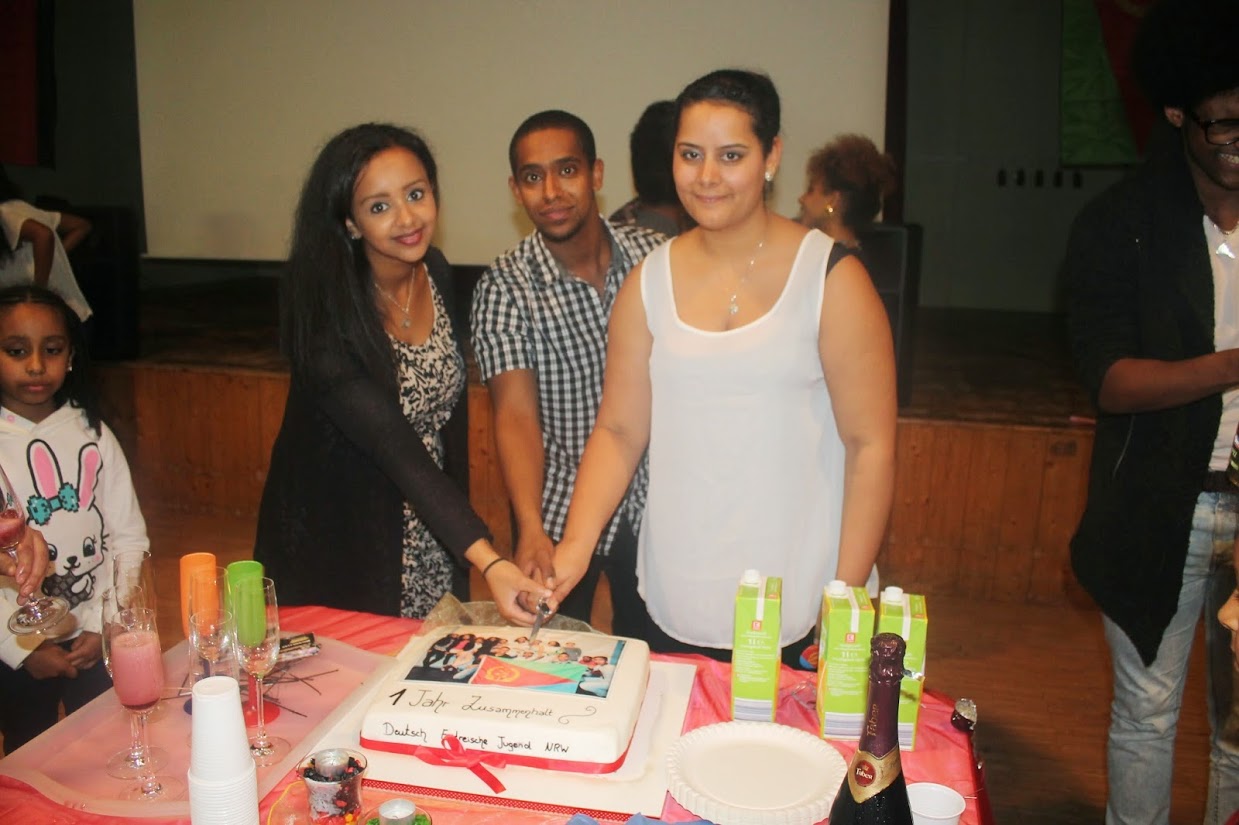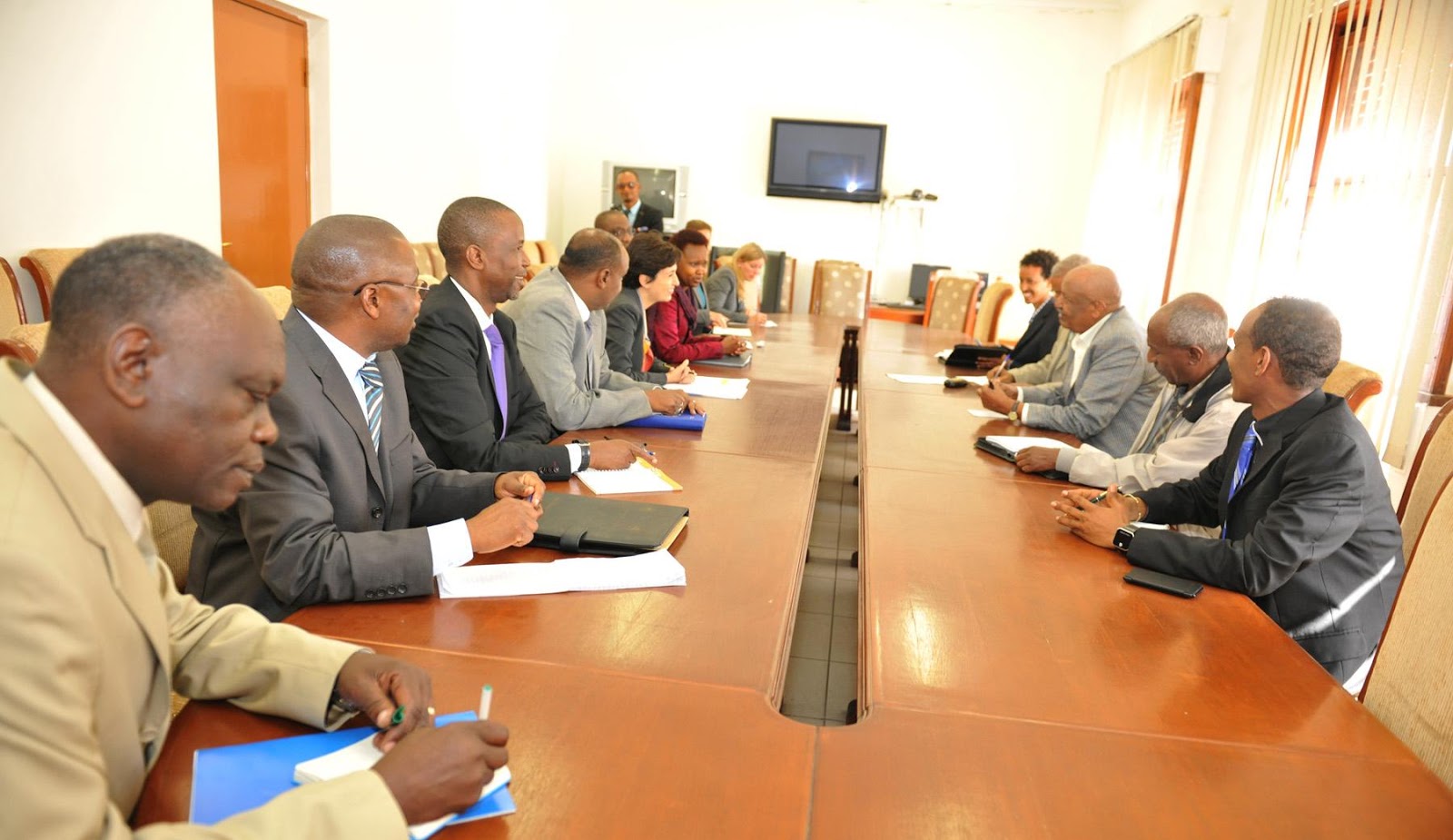![]() |
| Muriel in Asmara depicting the challenges Eritrea has faced in its modern history - the camel represents Eritrea overcoming these challenges (Image credit: DJ Adulis 'Chedo' Mokanan) |
Illegal and Immoral UN/US Sanctions on Eritrea, Fail Amanuel BiedemariamDuring an interview, April 7/2014, RT, former US Congressman and presidential candidate Ron Paul said that US imposed sanctions are in fact an “act of war.” He states,
“If two countries get in war, one of the most important things that they do is that they put down blockade – they prevent trade so the various countries can’t get their raw products. So, in that sense, the economic sanctions is doing something that happens in wartime, and that is preventing a government from getting certain things that are needed for the war.”
The US, using a client state Ethiopia, has been waging wars against Eritrea for decades. The aim, to kill nationalism, dissolve Eritrea, integrate Eritreans and make them Ethiopia nationals by any means in order to dictate regional and global terms.
Contrary to these sinister motives however, the trajectories always favored the people of Eritrea. Then as in now, Eritrea has been able to unshackle Eritrea from US and Ethiopia-set-trap and freed Eritrea. That is what makes Eritrea’s freedom unique because Eritrea is the only country in Africa that earned freedom with blood against the will of US after defeating successive Ethiopian regimes.
Furthermore, Eritrea understood, to ensure freedom she must follow an independent path, work towards complete emancipation based on the mindset of Self-Reliance, and use all challenges as pedestal to the next step; hence, embarked on nation building-process that prioritizes on human capacity building.
The self-reliance-mindset-based progress is what successive US administrations tried to stop. The war that Ethiopia started in 1998 aimed to stop Eritrea from seeding foundation, However, Eritrea kept marching. What they believed will last 6 months have gone-on for 17 years. In the process Eritrea managed to peel-off-all hurdles and is seeding stronger foundations that will serve generations of Eritreans.
What they tried to achieve militarily failed. As a result new mechanisms to isolate Eritrea and weaken her into submission were put forth. Initially there was an attempt to place Eritrea in the list of nations that sponsor terror. That was defeated by the hard work of Eritreans and late Congressman Donald Payne.
When that failed, illegally conceived UNSC Resolution 1907 (2009) sanction was levied to weaken Eritrea economically and militarily. The sanctions are illegal for many reasons but mainly because Eritrea was not even allowed to make her case. They denied President Isaias entry visa into the US until the very last minute when the decision was to be rendered.
Sanctions are as Congressman Ron Paul stated an act of war. The arms embargo that the UNSC Resolution 1907 (2009) levied was designed to tie the arms of the people Eritrea so Ethiopia can have its way militarily. Hence, the sanctions are a continuation of the war agenda, evidence that the US agenda have not changed and that the machinations continue unabated.
However, to their dismay, what remains constant is the resilience of the people of Eritrea and their ability to outmaneuver the machinations and come out on top.
Why US/UN Sanctions on Eritrea failedThe sanctions are integral part of the regime change agenda. The arms embargo is designed to deny Eritrea the ability to defend herself. The economic sanctions were designed to hasten hardship and arouse social upheaval. The sanctions are on their fifth year, but did it achieve what they intended?
In 2009, at the time that the UN announced the sanction, President Isaias Afewerki made simultaneous announcement that made the sanction dead on arrival. He said Eritrea has achieved food security with reserve.
When a nation fails to feed its people then that nation is prone to social upheavals. Considering where Eritrea started, achieving food security with reserve is a major achievement particularly relative to the African continent that is dependent on handouts for survival. Food aid is a tool that the West uses to control poor nations. The sanctions failed specifically because:
- The sanctions are supposed to create a wedge between the people and the government. However, the UN process and the unfair ways the US maneuvered the sanction incensed the people of Eritrea that protested worldwide to express their discontentment and affirmed solidarity with their government. The people and government came closer and dealt a blow to their agenda.
- The illegal arms embargo is designed to deny Eritrea the ability thus her inalienable right to defend herself. Did that work? The people of Eritrea are capable to defend their sovereignty no matter the circumstance or shortages. No sanction will stop them from defending Eritrea. After the imposition of the sanction, Ethiopia has in a number of occasions used force and was repulsed. To the contrary the minority regime is crumbling, leading Ethiopia towards instability and social unrest. Ethiopia is no position to threaten or wage wars against Eritrea. Direct result of Eritrea’s efforts that turned the table.
- The sanction’s initial intent was to take control of Eritrea’s mining revenues. Controlling the revenue stream means controlling the governance of the nation. Where is that agenda now? No sanction can deter Eritrea’s directions primarily because of the way Eritrea manages her resources and the economy, which is far sighted, meticulous and places capacity building in the center.
- Global appetite for resources is huge and Eritrea possesses amongst the most important resources the word needs today making enforcement impossible.
- The sanctions levied on Eritrea failed because it is unjust, illegal, politically motivated, agenda driven and does not serve the greater good. Moreover, sanctions overall have become tool used by the US to further its global agenda. This limits its effectiveness because it works counter the interests of all nations except EU/West.
KeyThe sanctions fail because Eritrea is willing and able to pay the price and endure. The regime change agenda’s first target was Eritrea. The unofficial arms embargo and sanctions levied on Eritrea after the war with Ethiopia were so-severe that if it had been applied on any other nation that nation would have buckled.
Eritrea was encircled on the South by Ethiopia, across the Red Sea by Yemen and on the North-West by Sudan, nations that made security-pact to isolate and deny Eritrea her natural trading paths. These neighboring countries placed the stringiest form of economic and arms embargo to suffocate Eritrea into submission. However, in a short time, Eritrea brilliantly managed to break through the threats and reestablished strategic relationship with the Sudan and Yemen.
Today, Sudan and Eritrea have opened their borders with free trade agreements. Yemen is in chaos and, Ethiopia is on the brink. The architects: Meles Zenawi is dead; Ali Abdullah Saleh of Yemen was ousted after being burned by demonstrators and under UN sanctions. President Omar Al Bashir of Sudan is being hunted by the ICC.
Eritrea was amongst the first recipients of US engineered sanctions and machinations. These sanctions are far-sighted and part of ill-conceived agenda designed to undermine Eritrea’s sovereignty by any means. Evidences are abundant on how successive US administrations abusively manipulated UN systems and regional actors to gain upper hand on Eritrea.
It is however a contradiction to see US and the so called “humanitarian organizations” proclaiming ad-nauseam Eritrea’s demise. They call Eritrea, “tiny, frail, hungry and inferior-to-her-gigantic neighbors etc...” While devoting tremendous attention and resources at the highest levels to bring her to her knees.
What this shows however is Eritrea’s strength. Eritrea is always able to meet these challenges and defeat their agendas. Before any country, Eritrea was able to stand up against these machinations and exposed it. Ironically, the countries that once cooperated to levy the ill-conceived sanctions are on the receiving-end. In fact, just three years ago Russia was pondering whether to vote or reject Eritrean sanctions. Today Russia and Eritrea are on the same boat-both under US engineered sanctions.
Eritrean Sanctions within the Global Context One of the reasons why UN/US sanctions are-no longer effective is because it does not serve the greater good. The UN is not the custodian of global interest; it is a tool the US uses to further its interests at the expense of all others.
Recently, when the US and EU failed to maneuver sanctions through the UN; US and the West imposed their own sanctions on Russia. The question, how will these sanctions influence Russia and, what are the global implications? What does it mean to the viability of the UN?
Russia is nuclear power with resources and veto power. The US and Russia have competing strategic interests. What the US does against the national interests of Russia is perceived as an act of war and part of a regime change strategy. That suggests a split at the UN and return to the Cold War like environment.
On the East, US policy “Asia Pivot” means amped-up challenge on China and its interests worldwide. While, at the same time China has expanded its economic sphere of influence using its financial upper-hand. The US is working with its EU allies in pursuit of these agendas. This juxtaposition has brought China and Russia closer. India, Brazil and South Africa have found an alternative (to the West that historically marginalized them,) and joined the alliance, BRICS. And the BRICS as a whole are looking to expand their sphere of influence globally.
Furthermore, the UN’s work focused more on humanitarian and human rights issues that the West and their agencies exploit to further their agendas. The UN failed to work on agendas that foster development, partnerships and cooperation. The UN essentially became a tool of the West. Hence, the new multi-polar world found alternatives to US led UN because the UN failed to serve as a vessel for greater cooperation and international relations.
As a result China and Russia specifically and, the BRICS as a whole have become alternatives to the US and the West. The BRICS are vocal and intent to challenge the West. For example, on May 20, 2014, Russia and China released a joint statement,
“Moscow and Beijing have rejected the imposition of sanctions as political tools and condemned attempts at “encouraging and financing” regime changes in other countries.”
ConclusionSanctions are in fact an act of war. The first major step Ethiopia took against Eritrea was reject Eritrea’s ports and stopped all trades with Eritrea. Eritrea in effect was under unofficial sanctions for a long time. But when that failed they legitimized the sanctions through the UN. The pressures on Eritrea have been consistent. Eritrea however, was able to withstand the punishments and managed to lessen the impact of these sanctions because of the unity of the people and their willingness to endure with an eye for a brighter future and knowing that victory is a must. The global geopolitical juxtaposition will ultimately neutralize the UN and mitigate US hegemonic agendas worldwide. But what the people of Eritrea did is demonstrate to the world that they need-no power to baby their nation and that they are in fact the true custodians of their sovereignty. Nothing or no one can change that.
Awetnayu@hotmail.comhttp://rt.com/news/207927-russia-europe-business-usual/http://rt.com/news/160128-russia-china-sanctions-rhetoric/
.svg.png)


.svg.png)





.jpg)


















